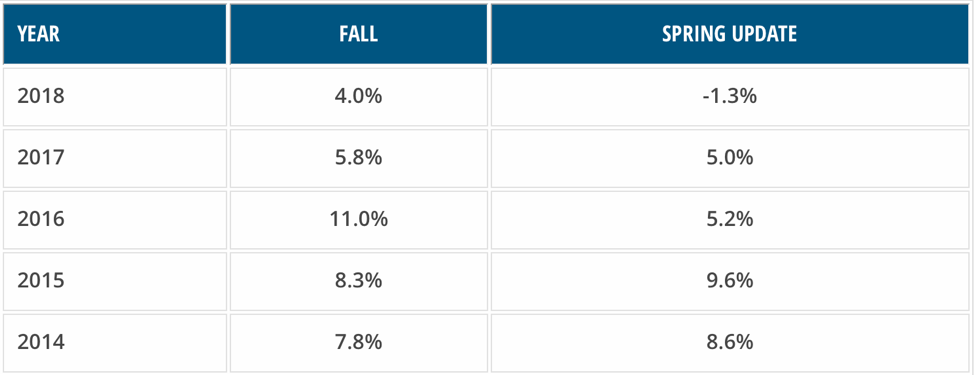As a freshly graduated, 22-year-old still wet behind the ears, I’m more than aware of the struggles of finding a job. Sure, it’s something that people of all ages tussle with, but being a new graduate with minimal experience, millennial stereotypes hanging over your head, and low confidence after weeks or months of probing makes the search for career opportunities that much harder.
It doesn’t take much looking to find the newest grads; we’re everywhere. According to the National Association of Colleges and Employers (NACE), employers plan to hire 1.3 percent fewer graduates from the class of 2018 than they did from the class of 2017. As shown in Figure 1 below, since 2016, the Job Outlook Hiring Projections have shown a decrease in the number grads hired–and these turbulent political times aren’t helping.
FIGURE 1: Job Outlook Hiring Projections, 2014-2018
But, according to a CBS News article, the chances of new graduates in 2018 finding a job is much better than those that graduated post-2007 during the recession.
So at least we have that, right? Wrong.
The jobs that some graduates are taking, CBS claims, are ones that don’t require the skills they learned in school. Could you even imagine a world where Carrie Bradshaw graduates from journalism school to become a barista? Okay, I’d still watch the show, but you get my point.
So, all of this to say, we need to figure out how to help new grads find jobs, talk about their experience, and start contributing to society the way all of you GenXers want us to.
Here’s what you can do to identify and recruit these talented new grads:
-
Let’s talk about experience.
As recruiters, you can help new grads present their experience appropriately on their resume. For this fresh talent group, it’s all too easy to take the job descriptions and just throw that verbiage into their resumes, but that doesn’t always translate well. You can help us discuss our skills and figure out the best way to highlight them on our resumes.
-
School projects can be more beneficial than you think.
Talk to these grads about new ways to discuss their past jobs/school experience/projects in interviews so that they can have a stronger impact on your hiring managers. Most of these experiences aren’t all that related to the real world, especially when it comes to school projects, but they are still opportunities to discuss how they managed the project, the role they had in its success, and how that academic experience can translate to career opportunities IRL.
-
You can’t judge a book by its cover.
Don’t judge candidates right away just because of their interview or personality assessment results because you’ll miss out on their other valuable qualities such as creativity, honesty, or collaboration. Sure, if they absolutely bomb the first interview or even the phone screen with you, it might be hard to see how they’ll be able to make it, but remember that you can help them present their personality more positively and make them feel more comfortable with the interview process.
-
Get any and every work sample you can.
Being a new grad means that these candidates should still have all of their projects from classes or internship work samples that they have accumulated over their college career. It’s also a great way for them to show potential employers what they can do without having to say it outwardly. Use your experienced eye to help them twist that portfolio into something that will impress hiring managers.
-
Communicate all of the steps.
As talent pros, you know how long the interview/hiring process takes – but it’s easy to forget that recently graduated talent lacks that same experience. Nothing is more discouraging, as a student, than waiting and waiting and waiting to hear back from recruiters or hiring leaders at a company. Even if it’s just a small update, it will be sufficient enough to keep your talent’s interest and engagement in certain positions.
-
Use social media!
I noticed a trend with the folks I graduated with that didn’t already have jobs lined up post-graduation: They turned their social media accounts into their own personal branding tools. To better market themselves, some students will adjust their online profiles to look and feel more professional. However, they aren’t just doing it on LinkedIn, it’s happening on Twitter, Instagram, and even certain Facebook pages as well–so meet new grads where they are already spending their spare time and utilize these FREE talent gold mines!
-
For millennials, it’s all about the benefits and the environment.
Frame the benefits package that will be offered as one of the top reasons for someone to take the job. After years in school, and waiting for the perfect job, we want to know how this organization is going to treat us. This also presents the opportunity to discuss the client’s philanthropic efforts, sustainability implementation, and training programs. Millennials love that ish.
Above all, empathize with the candidates. This is one I know I don’t have to tell anyone at Kinetix because we already have it down, but it’s still necessary to say to recruiting pros everywhere. Talk about your experiences and your struggles with finding a job. It will help to calm some nerves and make the new grads feel more like a friend, and less like someone just there to fill your talent pipeline.
Now go get those grads!

